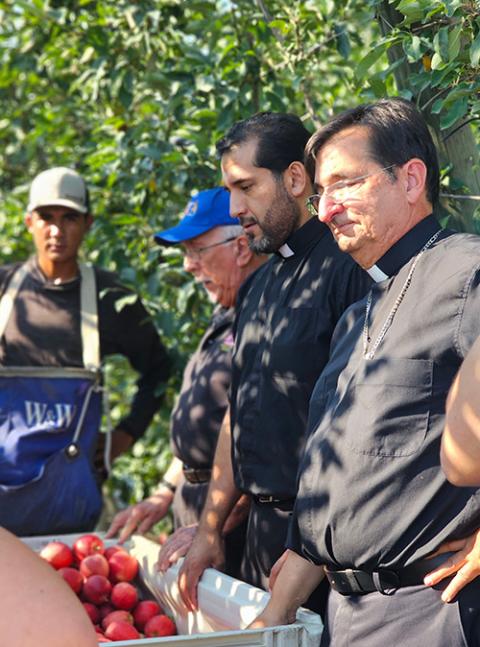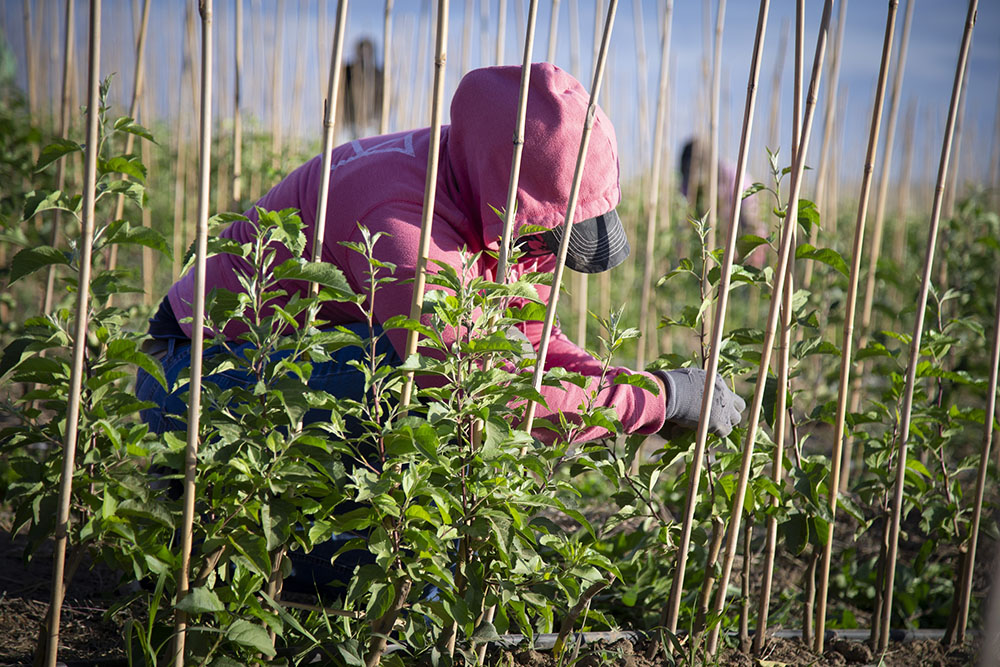
Bishop Joseph Tyson, right, meets with migrant farmworkers at a farm in Prosser, Washington, during the cherry harvest, Aug. 2, 2017. (Diocese of Yakima/Edgar Quiroga)
Like Catholic parishioners across his diocese, Bishop Joseph Tyson of Yakima, Washington, can tell the warming climate is changing the land where he was born. But not everyone agrees on what exactly that means, or what to do about it.
"Most folks in central Washington don't think or use the language of climate change, but if you talk to growers, they can tell you about the cycle" changing, Tyson said. "They can tell you that, 30 years ago, cherries were not coming in May. They were coming more in June" and peaking around July 4, he said.
Potatoes now have to be planted 5 inches beneath the earth, rather than three, to insulate them from the heat, said Tyson, who was born in prolific potato-producing Grant County in his diocese and baptized at St. Paul Cathedral in Yakima.
Tyson, who became bishop of Yakima in 2011 after six years as an auxiliary bishop in Seattle, spoke with NCR shortly after a meeting with senior White House officials on Nov. 17, where a delegation of U.S. bishops and a Catholic sister discussed climate change and environmental protection in light of Pope Francis' recent climate teaching in Laudate Deum.
The Yakima Diocese covers seven counties across central Washington. Tyson told America magazine in 2015 that about 75% of Catholics in the diocese speak Spanish.
The bishop also serves as the episcopal moderator for the Catholic Climate Covenant, a national ministry to care for creation and the poor.
Tyson told NCR that he sees agriculture workers throughout his diocese care for the environment. Many farmers in his diocese use efficient drip systems to water their fruit crops. The large apple-packing plant in Yakima has installed 600 solar panels.
But still, Tyson said, "Our farmworkers work hard in the field and feel the effects of heat and of smoke."
Tyson said that the smoke sometimes drifts down from wildfires in British Columbia, and 2023 was "another hard year" for smoke. That heat and smoke can also affect the crops in the orchards.

From right, Bishop Joseph Tyson, Fr. Jesús Mariscal and Fr. Richard Notter meet farmworkers Aug. 28 during an annual pastoral visit to migrants by representatives of the Catholic Migrant Farmworker Network and the U.S. bishops' Subcommittee on the Pastoral Care of Migrants, Refugees and Travelers. (Diocese of Yakima/Ana Contreras)
This summer, the state of Washington implemented new permanent heat rules requiring access to shade, cool drinking water, and rest periods, making it one of few U.S. states with heat protections.
In 2020, a massive wildfire burned through Bridgeport, a small community in the diocese where parishioners are entirely Spanish-speaking. "The earth had dried out," Tyson said. "The whole town was surrounded."
"Fifteen of our families had to relocate due to fire, and these are folks that have already migrated from Mexico," Tyson said, noting that their experiences pointed to the broader issue of climate change triggering migration.
"Everybody notices things going on in the environment. I think there's a lot of contention, disagreement in terms of causes. Now, there's also a certain reluctance to sympathetically and robustly read the scientific data," he said.
"We discern the call from God from real data about our lives and about the world around us and allow that to feed our spiritual life, our moral life and the choices we make," he explained. "[Pope] Benedict XVI was so eloquent in talking about how faith is a flashlight to reason. It's faith and reason together."
Tyson said, "We need to be courageous in looking at and considering the scientific data that's developed over years around the change in the climate, and use that data."
He spoke about "the need for us to prayerfully study, to read, to reflect, to find steps that we can take in our local area to depolarize and rehumanize the questions of how we're working together to care for the Earth."
As Francis and apostolic nuncio Cardinal Christophe Pierre have pointed out, Tyson said, "polarization occurs when we debate ideas rather than focus on people."
Advertisement
Tyson also explained the difficulty of working with many stakeholders on environmental issues. He focused on the management of the Columbia River watershed as an example.
"The management of the Columbia River watershed really depends on an encounter between shipping and barging and hydroelectric and the Native American nations and the First Nations of Canada and agriculture," Tyson said.
Maintaining just relationships with all of those stakeholders is complicated, said Tyson, who cautioned against demonizing anyone. "It's a fairly big challenge, and it takes all of us," he said.
For instance, if dams are taken down that will have an impact on water conservation and irrigation, but if they are kept, it will negatively affect the fishing opportunities for fisheries and Indigenous people, he said. Ranches can also impact the watershed with spilloff.
"How do we bring people together, people who might be in conflict, and create some kind of social friendship among very competing stakeholders to really care for the environment, care for God's creation, because we all share the same land?" Tyson asked.

A migrant worker prunes a young apple tree May 29, 2018, in a field in Prosser, Washington. (CNS/Chaz Muth)
In the Old Testament, "the land really sealed the relationship between God and his people," Tyson said.
"How we treat the land was symbolic of our relationship with God. When the land flourished, people flourished. When the land was not cared for, it affected people," said Tyson. "I think we're seeing the same thing today to some degree."
He emphasized that Francis has drawn on a "long teaching journey" on the environment that Popes John Paul II and Benedict XVI contributed to. "This is not about some abstract environmentalism," he said.
Looking at the 2015 environmental encyclical Laudato Si', "Pope Francis is always putting the human person at the center of the environment," Tyson said. "Or going back to Pope Benedict XVI's address to the [German] Parliament, humans are part of the environment."
"Our faith invites us to embrace the mystery and the unknown and rely all the more on God and be guided all the more by the Holy Spirit," as we sort through climate change and "our just relationship with each other and the climate," said Tyson.





